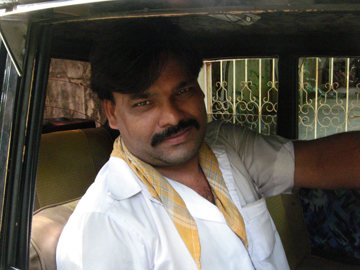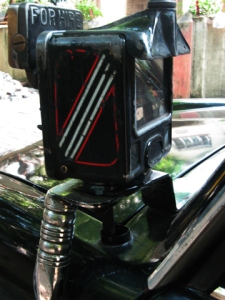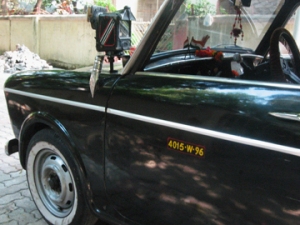episode 23 mahadev singh
Kala Ghoda. The rains had disappeared. Eid had been celebrated. Dusserah also. There was a taxi and in it Mahadev Singh. When he left Jharkhand 20 years ago as a 20-year old youth, it was Bihar he left. He came with friends who were cooks in homes on Malabar Hill. He didn’t like cooking. He has been driving a taxi for 10 years. This is his story. Click on ‘mahadev singh podcast’ link below to stream or right click to download. (26 min 21 sec)
mahadev singh: idhar aye ek baar toh phir idhar se jaane ke dil nahin karta
What I heard, what came through, was the ambivalence experienced in the midst of change. A change to taxi driving, a city changing around him. Passengers picked the new vehicles to ride in. No one wants to ride in a fiat anymore. But as we spoke about the fiats, they became the desired, they have room for legs, room for luggage. Poised on the point of change, teetering between what was and what is becoming, what will be lost and what is being gained, Mahadev Singh spoke from both sides. We can contain these feelings, the simultaneous good and the simultaneous bad.
I spoke to my first Meru driver. It was his 4th day driving. He was an older man who had driven kaali-peeli all his life. He owned three taxis that he rents out. He said he wanted to see what it was like to drive this fleet taxi. But he didn’t hold much stock in it. He was going to give it a month test. He liked the A/C but he thought in the end he could make as much money driving less hours in his own taxi. There was an article in the Wall Street Journal about kaali-peeli drivers attacking Meru drivers because of the competition and loss of business. Though I have never heard about it, I guess it has happened. Man does bite dog sometimes. But I have asked every driver about Meru and have never heard any hostility. They seem to feel that there are enough fares for everyone, that enough people won’t pay extra, or can’t pay extra for the comfort of A/C or the convenience of electronic meters. I admit though, I haven’t asked the Meru drivers their side of the story.
Mahadev Singh lives in a flat, in Mahalakshmi, with running water and a bathroom . The rent is Rs3000/mo which is the price of the maintenance the owners have to pay. This is a flat in a new building erected on the site of demolished jopad-patti and his landlords are rehabilitated jopad-patti dwellers. I have another friend who lived in a run down broken room in a rundown broken building that got torn down by a builder and from that she was given a nice flat with a kitchen and a bathroom in a nice building full of supportive rehabilitated neighbors at a maintenance she can afford. These stories aren’t all bad. But there aren’t enough good ones. More people don’t get flats or though the flat are free, the maintenance is too high to afford or the flats are too far away to make it to work or they get trundled off to transit camps from where they never leave or they can’t prove they are eligible for a new flat, they can’t prove they exist. Lately Dharavi redevelopment land grab has been in the new daily here, here and here for instance.
This is the only outtake. Because traffic was light, because we took the sealink, the raw audio was much shorter than usual. I cut this out of the podcast mostly because it came at the end, and the ending is too abrupt. Nothing lingers. I knew the answer to this question, which is why I asked it. Patrilocality. The daughter leaves her home and belongs to another family elsewhere. How can you give you daughter her inheritance of your land if she belongs to another family somewhere else? In its stead is dahej, rakhi, maamera/maayra/naanero, these cultural strategies for passing inheritance to daughters but end up devaluing their births. (34 sec)
My friend Kannu wants to put his son, Divesh, in a boarding school like Mahadev Singh has done with his son. Kannu lives in Bombay and makes his money as a maharaj, cooking for various families. His village is 45 kms from Udaipur on the Chittorgarh-Udaipur road. He himself is an 8th class fail. He says boy children are too difficult to discipline and the women in the household anyway are too busy. I think about all the fathers in distant cities and wonder about this migration where men leave their families and spend decades away earning the money that farming no longer provides.
I think Mahadev Singh is right about the sealink. Rs30 is just about the right price where people would take it instead of inching along and jockeying for position amidst the pollution and honking in the Cadell Rd/LJ Rd traffic. Rs50 is just over that amount that most people will pay. People who have cars that is, people who are used to paying for petrol. I have only taken the sealink in taxis to augment this blog with more photos and videos and scenes of Bombay from out in the water, the city from a distance.
The intro music in the podcast is the song Boombai Nagari from the movie Taxi 9211, sung by Bappa Lahiri, Merriene , Nisha and Vishal Dadlani.
Music by Vishal Dadlani and Shekar, lyrics by Vishal Dadlani and Dev Kohli





















1, November 2009 at 10:46 pm
I’ve just listened to three of your podcasts and loved them! The people, the stories and the depth of detail… My father drove a taxi in london and we always knew that, just like him, other drivers had a story too. But we didn’t know what a global narrative this was: family, money, seeing the city change, the fleeting notion of home, having an opinion about it all… You make these connections and the city come to life… Beautiful! Look forward to the next one…
Audrey
25, November 2009 at 5:09 pm
Hi Audry
I love that your father was a taxi driver. You must have heard some great stories and seen first hand what a tough job it actually is. thanks for leaving a comment. Working on the next one now.
stay tuned…
kabi
17, November 2009 at 8:54 pm
A quick thumbs up from Holland! Good stuff, Kabi, keep it up!
This sure helps me work my Hindi. I loved the transcripts you did some time ago; they were really helpful. At least to show how colloquial Hindi is quite different from the more formal stuff in text books 🙂 and then some
Any chance of doing some more transcripts?
At any rate, can’t wait for the next episode!!
Miguel
25, November 2009 at 5:12 pm
Hi Miguel,
If only it had been I that did the transcripts my problem would be solved. But it was someone else who has stopped doing them. I could do them…but it would take me forever. I was looking for someone then didn’t find anyone and then it sort of fell of my to-do list. Now I resolve I will try to get them back. I can see how it would be helpful.
Are you learning Hindi for studies? or because of someone? Must be harder to find people to practice with.
thanks for listening.
Best
kabi
29, November 2009 at 4:06 am
Ah, Kabi, great podcasting, terrific stories from cabbies. Sure I’m signed up for your new p’casts, but I’ve got some catching up to do on your blogpages. It occurs, you might enjoy the Jim Jarmusch’s movie “Night On Earth” from 1991, a story of five taxis (their drivers and fares) in five different cities and time zones, all taking place at the same time.
Mischa
1, May 2019 at 6:28 am
Superb blog! Do you have any recommendations for aspiring writers?
I’m hoping to start my own blog soon but I’m a little lost on everything.
Would you advise starting with a free platform
like WordPress or go for a paid option? There are so
many choices out there that I’m totally confused ..
Any ideas? Thanks a lot!